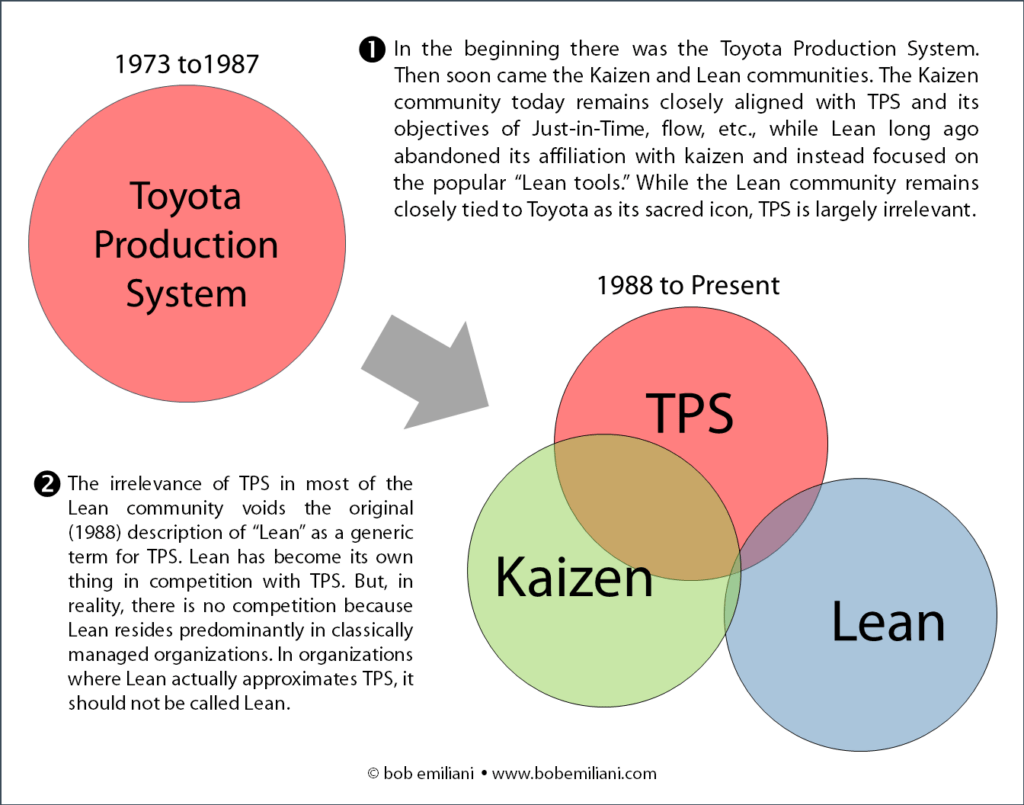
Who hasn’t been fooled by James Womack and Daniel Jones‘ longstanding characterization of “Lean” as a generic term or synonym for TPS (and many years later, for The Toyota Way as well)? It is only a question of how long one is fooled. 10 years, 20 years, 30 years, soon to be 40 years? Even Toyota got caught up in the confusion (here, here, and here, but not here).
I recall the esteemed professor Dr. Robert “Doc” Hall sounding the alarm in the early 2000s, that Lean and TPS were not the same thing. He noticed an increase in the speed of divergence between TPS and Lean and he called it out. Nevertheless, nearly everyone bought into the myth even though its central element, “Respect for People” was missing for nearly 20 years.
Let’s go back in time. In the beginning (1973) there was the Toyota Production System. Then, in the decade or so that followed, came the Kaizen and Lean communities. The Kaizen community today remains closely aligned with TPS and its objectives of Just-in-Time, flow, etc., while Lean long ago abandoned its affiliation with kaizen and instead focused on the popular “Lean tools” (value stream maps, A3 reports, gemba walks, coaching, kata). While the Lean community remains closely tied to Toyota as its sacred icon, TPS is largely irrelevant.
The irrelevance of TPS in most of the Lean community voids the original (1988) description of Lean as a generic term or synonym for TPS. Lean has evolved its own thing despite efforts to prevent that. Consequently, Lean has been in competition with TPS for the last 20 years or so; competition as a philosophy, concept, principles, methods, practices, and tools. But, in reality, there is no competition because Lean resides predominantly in classically managed organizations.
In organizations today where Lean actually approximates TPS, it should not be understood as Lean or called Lean, as this only adds to the confusion. Call it X Company Production (or Management or Business) System, Flow Creation System, or something else.
The shift from “Lean” as a generic term or synonym for TPS was partly due to the late 1990s change in strategy by the Lean Enterprise Institute and the Lean Enterprise Academy and partly due to incessant business marketplace demand for tools. Even if LEI and LEA had done everything possible to maintain Lean as a generic term or synonym for TPS, consultants, trainers, and business people would have quickly reduced it to a small set of tools. But, there was little to no fight over the integrity of Lean by Lean movement leaders and influencers — certainly not to the extent that Scientific Management movement leaders and influencers fought over the integrity of Scientific Management.
An important lesson is to study the history of progressive management so that one can anticipate what might go wrong and make plans to avoid undesirable outcomes. But the folks who gave us Lean thought there was nothing to learn from the experiences of the Scientific Management leaders and influencers when there was, in fact, everything to learn from their experiences (see here, here, and here). The extraction of tools from Scientific Management resulted in a new product with a new name, “Efficiency,” and like Lean, it fooled a lot of people. It too resided predominantly in classically managed organizations. The obvious parallel for both 1920s Efficiency and 2020s Lean is no major change in management thinking and practice; no widespread transition from classical management to progressive management — just efficiency improvement. The “Lean” success stories that we are all familiar with are actually high fidelity applications of TPS inclusive of The Toyota Way.
Another important lesson is that the Kaizen community saw, and never lost sight of, the linkage between kaizen and the creation of TPS and The Toyota Way, and kaizen as a method to create similar management systems in other organizations. That attests to the fundamental importance of kaizen and of mastering the basics related to analyzing and improving work — something that the popular Lean tools do not do. Any of the success stories featured lots and lots of kaizen, with so-called “Lean tools” (and others) used within the context of kaizen, not external to it as is nearly always the case with Lean.
A final important lesson is for what comes after Lean, the next iteration of progressive management, whatever it might be called, if there is a next iteration given that AI will likely disrupt progressive management. It comes from the English rock band The Who. Hopefully, “We don’t get fooled again.”
When you invent the ship, you also invent the shipwreck; when you invent the plane you also invent the plane crash; and when you invent electricity, you invent electrocution. Every technology carries its own negativity, which is invented at the same time as technical progress.
Paul Virilio, Philosopher, Politics of the Very Worst (1999)
And so it is, when you invent Lean, you invent… Junk Lean.
